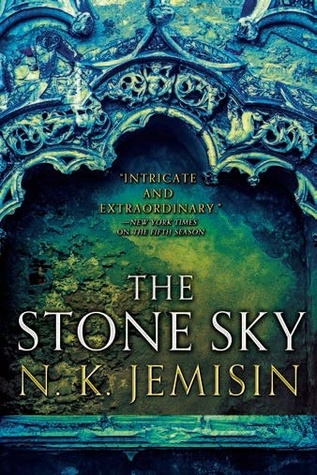I will tell you how I opened the Gate, and flung away the Moon, and smiled as I did it.
And I will tell you everything of how, later, as the quiet of death descended, I whispered:
Right now.
Right now.
And the Earth whispered back:
Burn.The Stone Sky – the final volume in N. K. Jemisin's The Broken Earth trilogy – does not disappoint: Questions are answered; action rises to an earned conclusion; the whole has something to say about humanity and our failings. I think I may have liked a bit more of each (answers, action, philosophy), but I am overall satisfied. This book might be the most cinematic of the three (I kept imagining what different scenes would look like on the big screen), and that was also a satisfying experience; Hollywood could do worse than adapting this series. This review will have no more spoilers than the first two volumes would have led the reader to expect.
“G-g-gone! I want it all GONE, Schaffa! I want it to BURN. I want it burned up and dead and gone, gone. NOTHING l-l-left, no more hate and no more killing just nothing, r-rusting nothing, nothing FOREVER –”Nassun might only be nine years old, but after a childhood that saw her needing to suppress her natural gifts (under the control of what she perceived to be her cold and cruel mother), after discovering her little brother beaten to death by the father who then kidnaps her, after entering the fear and confusion of a new Season, travelling to Found Moon and witnessing/participating in traumatising conflict there, Nassun has seen enough and learned enough about how the world works to want it destroyed.
He squeezes her, very gently. “You're my redemption, Nassun. You're all the children I should have loved and protected, even from myself. And if it will bring you peace...” He kisses her forehead. “Then I shall be your Guardian till the world burns, my little one.”And Nassun won't be fighting on her own: With the rogue Guardian Schaffa and the Stone Eater Steel on her side, Nassun will have just enough help and information to make it to Corepoint and attempt to activate the Obelisk Gate; to destroy the Earth that seems bent on destroying her. But can you really trust a Stone Eater or a Guardian?
It changes things, somehow, to understand you go to face a fate that an Equatorial lorist wants to record for posterity. Now it's not just a caravan. It's a rusting quest.Meanwhile, Essun also wants to find her way to Corepoint (turns out there's more than one way to make it to the other side of the globe), but her goal is the opposite of Nassun's: If Essun could only open the Gate and catch the Moon, this Season's effects would be softened, and Nassun – her only living child – would have a chance at survival. Incidentally, I loved the idea that lorists are traditionally trained as warriors; that it might take strongbacks to survive a Season, but it takes a lorist to survive five or six.
“Hello, little enemy.”Yet while the Orogenes and Stills, Guardians and Stone Eaters, people of every caste-use and comm align with the faction they hope will win this final confrontation, we are reminded that there's a third side in this war; and that side's furious.
Some worlds are built on a fault line of pain, held up by nightmares. Don't lament when those worlds fall. Rage that they were built doomed in the first place.As to the overall philosophy: The description of the deadciv city of Syl Anagist really does sound like a utopian future to the reader of today. If we could create that world, even if its foundation is one of pain for a few lesser-than-humans, we just might give the Genengineers free reign. Don't humans always bull ahead with whatever we can do without stopping to ask if it's something we should do? And what's so great about humans anyway? Nassun understands that “destroying the world” doesn't mean “destroying the planet”; Earth itself will be fine long after we're all gone. And in a way this reminded me of The Road: One of the things I loved about that book was the unspoken question, “Whose world is this?” The father wants to survive for its own sake, remembering the world he grew up in as something worth recapturing. The son only knows the dystopia, and considers this new world on its own terms; understands that the old rules might not apply. And which of them is right? And who's right between Essun and Nassun: Is it more righteous to save the world in order to rebuild it? Or to wipe out what was “doomed in the first place” and end generations of pain and abuse?
As to the action: This book wasn't quite as thrilling as it might have been. Neither side faced any real danger until they got to Corepoint.
And as to the answers: We learn what caused the Shattering – the first of the Fifth Seasons – and that was interesting and satisfying. But while we also learn where the Stone Eaters and the Guardians came from, I don't know if I 100% understood (or caught) the full explanations. Could be my own failing.
As I said after reading Fifth Season, I totally appreciate the unique voice that Jemisin, as a woman of colour, brings to the Fantasy genre. I love the diversity and the strong females (listen up, Hollywood); the focus on relationships instead of just blowing stuff up. With this third volume, Jemisin completes her picture of a complete and peculiar world and achieves what the best of Fantasy always does: Holding a funhouse mirror up to the reader of today and showing that no matter how the details are distorted, we'll always be the same fragile, fallible, cruel, and often enough, honourable, humans on the inside. Totally worth the journey.

